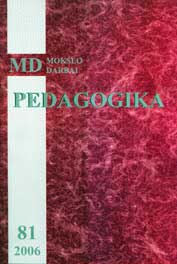Mokytojų organizavimo kopmetencijos raiška edukacinėje praktikoje
Expression of Teachers’ Organizational Competency in Educational Practice
Author(s): Emilija RodzevičiūtėSubject(s): Education
Published by: Vytauto Didžiojo Universitetas
Keywords: teacher; organizational; competency; educational practice
Summary/Abstract: The rapid political, economical, social, and organizational changes, the expansion of the information communication technologies, and globalisation challenge modern man. Only constant improvement gives a human being opportunity to adapt to permanently changing information world. The state of education is also changing according to these alterations. Nowadays rapid and complicated development of the world challenges teacher trainers and their pedagogical competencies. A teacher’s organizational competency is one of the most important competencies in a teacher’s profession determining qualitative effectiveness of the educational process. Proper organization of the educational process ensures a successful realization of the educational objectives. The aim of this article is to compare teachers’, schoolchildren’, school leaders’ and students’ attitudes towards organizational competencies and to find out if future teachers’ attitudes towards teachers’ organizational competencies differ from the ones of other participants of education. 535 secondary school teachers, 52 school leaders, 1114 schoolchildren (XI–XIIth formers), and 248 students as future teachers participated in the research. The study results have indicated that the students gave the lowest evaluation to organizational competency in the set of overall competencies with the highest ranges among other groups of the respondents. The students’ (45,2%) and schoolchildren’ (50,4%) evaluations towards organizational competency matched most. The school leaders (67,3%) put organizational competency into the second place on the list of the most important competencies leaving the first place to the methodological competency. The teachers placed organizational competency into the third place. Evaluations given by the teachers and school leaders are close. The students’ attitude towards teachers’ competency in organization of the educational activity should be changed in the course of their studies trying to make the attitude closer to the one of the school leaders who have practical experience in educational activities.
Journal: Pedagogika
- Issue Year: 2006
- Issue No: 81
- Page Range: 42-46
- Page Count: 5
- Language: Lithuanian

